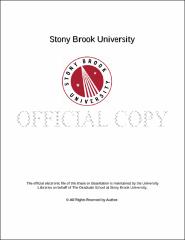| dc.identifier.uri | http://hdl.handle.net/11401/76098 | |
| dc.description.sponsorship | This work is sponsored by the Stony Brook University Graduate School in compliance with the requirements for completion of degree. | en_US |
| dc.format | Monograph | |
| dc.format.medium | Electronic Resource | en_US |
| dc.language.iso | en_US | |
| dc.publisher | The Graduate School, Stony Brook University: Stony Brook, NY. | |
| dc.type | Dissertation | |
| dcterms.abstract | Trait diversity often underlies complexity observed in biological systems. Whether it is behavior, life history, form or function, variation imparts differential performance on the organism, which may influence processes at higher levels of organization. Using two approaches, my dissertation research concerns the appraisal of diversity in fishes and its consequences for their ecology and evolution. The first two chapters focus on variety of spatial behaviors in northwest Atlantic marine communities. Temporal changes in community habitat utilization, as quantified by the interspecific abundance-occupancy (A-O) relationship, were the focus of chapter one. Trends in the A-O relationship indicated large-scale reorganization in some communities, with assemblage structure shifting towards organisms with shorter life histories and rapid colonization potential. For chapter two, I developed a Monte Carlo simulation to investigate the role of spatial distribution in the realization of temporal A-O trends. This work showed that the empirical results obtained in chapter one may be recreated from a collection of negative binomial-distributed catches derived from natural communities. Changes in spatial behaviors of species were implicated in a notable example of rapid community change in the Gulf of Maine. The second half of my dissertation examines the morphological diversity of Batoid fishes (skates, rays and allies) and its relation to factors associated with ecology and life history. In chapter three, I used geometric morphometrics to provide an initial assessment of pectoral fin diversity among many of the existing Batoid families. A majority of shape variation corresponded with taxa having rounded versus triangular fins. This was highly correlated with aspect ratio, a characteristic related to swimming mode and lifestyle. In my final chapter, I examined developmental shape trajectories in three species of northwest Atlantic skate. Divergence of body shapes in these fishes appears to be related to the development of sexual organs at maturity. Patterns of variation between the species are discussed relative to the evolution of disparate reproductive strategies and life histories. | |
| dcterms.available | 2017-09-20T16:42:20Z | |
| dcterms.contributor | Levinton, Jeffrey | en_US |
| dcterms.contributor | Frisk, Michael G | en_US |
| dcterms.contributor | Chapman, Demian | en_US |
| dcterms.contributor | Rohlf, F. | en_US |
| dcterms.contributor | Duplisea, Daniel. | en_US |
| dcterms.creator | Martinez, Christopher Michael | |
| dcterms.dateAccepted | 2017-09-20T16:42:20Z | |
| dcterms.dateSubmitted | 2017-09-20T16:42:20Z | |
| dcterms.description | Department of Marine and Atmospheric Science. | en_US |
| dcterms.extent | 157 pg. | en_US |
| dcterms.format | Application/PDF | en_US |
| dcterms.format | Monograph | |
| dcterms.identifier | http://hdl.handle.net/11401/76098 | |
| dcterms.issued | 2014-12-01 | |
| dcterms.language | en_US | |
| dcterms.provenance | Made available in DSpace on 2017-09-20T16:42:20Z (GMT). No. of bitstreams: 1
Martinez_grad.sunysb_0771E_12071.pdf: 6845766 bytes, checksum: e8cc20d4377df94c3f4f78663dcf02a7 (MD5)
Previous issue date: 1 | en |
| dcterms.publisher | The Graduate School, Stony Brook University: Stony Brook, NY. | |
| dcterms.subject | abundance-occupancy, batoid, community, geometric morphometrics, northwest Atlantic, Rajoidei | |
| dcterms.subject | Ecology | |
| dcterms.title | Diversity of Skates (Batoidea: Rajoidei) and the Spatial Structure of NW Atlantic Communities | |
| dcterms.type | Dissertation | |

